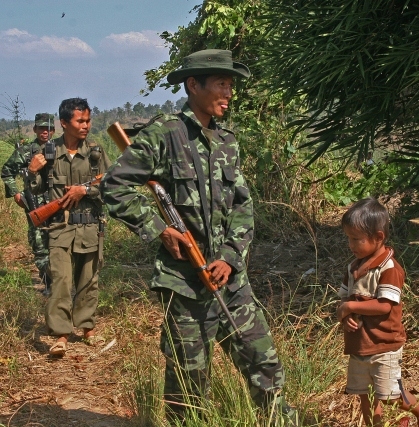Two ethnic armed groups in Burma recently signed a “deed commitment” with a Swiss-based human rights group, pledging to eliminate underage soldiers and protect children in armed conflicts.
 The Karenni National Progressive Party/Karenni Army (KNPP/KA) and the New Mon State Party/Mon National Liberation Army (NMSP/MNLA) agreed to ensure that children aged under 18 are not recruited into or used by their armed forces, according to an article by IRIN, a service of the UN office for the coordination of humanitarian affairs.
The Karenni National Progressive Party/Karenni Army (KNPP/KA) and the New Mon State Party/Mon National Liberation Army (NMSP/MNLA) agreed to ensure that children aged under 18 are not recruited into or used by their armed forces, according to an article by IRIN, a service of the UN office for the coordination of humanitarian affairs.
The agreement, coordinated by Geneva Call, ensures that children aged under 18 are not recruited into or used by their armed forces, and are also required to meet obligations related to the well-being and rights of children affected by armed conflict, such as education and assistance for children in areas under their control.
“Our policy is to respect international humanitarian law in a military operation,” New Mon State Party spokesman Hong Sa told IRIN. “We fully welcome international monitoring.”
In 1995, the Mon party signed a cease-fire agreement with Burma’s military government but tension remains after the Mon refused to lay down their arms in 2010 in order to join the government’s Border Guard Force.
“The action that they took by signing on to the document is the right way to go and we want to encourage that other non-state groups do the same,” said Phil Robertson, the deputy director of Human Rights Watch's (HRW) Asia division.
“I think it's significant, because it points in the right direction and re-emphasizes the commitment by some of the ethnic groups that, in fact, recognize that this is a problem that needs to be addressed,” Robertson said.
In 2011, HRW documented the continued recruitment and use of child soldiers by all parties in Burma’s ethnic conflicts, in violation of international law.
Observers are waiting to see if larger ethnic groups like the Karen, the Wa and the Kachin follow the example of the Karenni and the Mon.
“Regarding child soldiers, we have already signed deeds of commitment in 2007 with UN agencies, and we no longer have any child soldiers among our troops,” said Karen National Union Vice President David Thakrabaw.
He commended Geneva Call’s initiative, but said he is skeptical about the government’s recent pledge to stop recruiting and using child soldiers.
“We are interested in this process [of pledging not have children in the army] because the government side is still using child soldiers,” he said.
Child soldiers refers not only to those who take up arms, but also children under 18 years who are a part of an armed force in any capacity, including cook, porter or messenger.
In June, a group of UN agencies, headed by the UN Children’s Fund (UNICEF), signed a joint plan with Myanmar’s Defence Ministry that set a timetable and actions needed to release and reintegrate children associated with government forces, as well as prevent any further recruitment.
“I would hope that the Tatmadaw [Myanmar Armed Forces] will recognize that there can be a mutual immobilization of child soldiers on both sides of these armed conflicts,” Robertson said.


